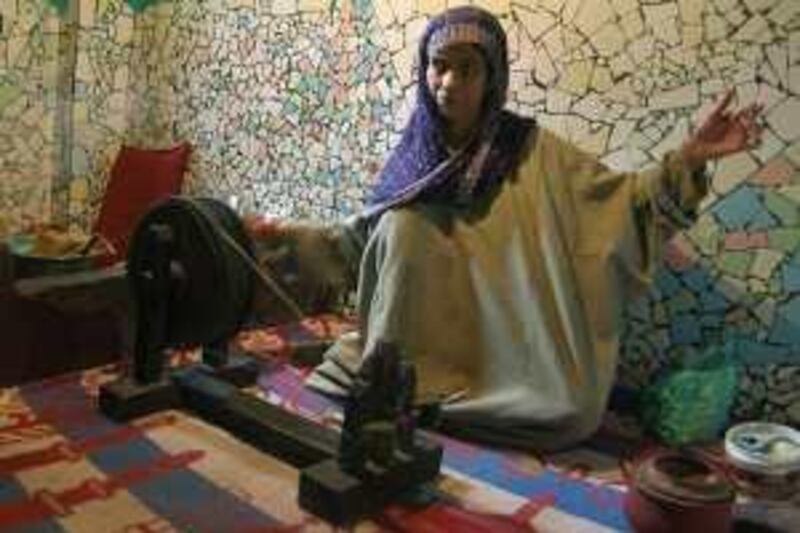SRINAGAR, INDIA // India's Central Bureau of Investigation and the newly established Wildlife Crime Control Bureau seized millions of dollars worth of banned shahtoosh shawls at New Delhi's international airport this month. The shipments of the garments, woven from the wool of endangered Tibetan antelopes, also known as chirus, were marked for delivery to Qatar and Oman, officials say. Charges have been brought against a business operating in the Kashmiri capital and another in Jaipur in the Indian state of Rajasthan.
The trade in shahtoosh, known for its lightness, softness and warmth, is banned under the Convention on International Trade in Endangered Species. India endorsed the ban in 1976 and the Srinagar government did likewise under mounting pressure from wildlife activists and environmentalists in 2002. The airport seizure comes after Kashmir wildlife authorities had put microchip tags, weighing less than a gram, on 953 shahtoosh shawls and products in possession of local residents. This followed the Indian Supreme Court order that all shahtoosh items owned by people in Kashmir be registered. The microchips carry registration numbers, dimension details and photographs of the property owner.
"The owners can use these products but cannot sell them, nor is the certificate transferable," said A Naqash, an official in charge of the shahtoosh inventory, adding that the digital tags are tamper-proof. Officials in New Delhi said shahtoosh shawls are found not only in clothes closets in Kashmir, which has a long history of producing the materials worn by the well-to-do, but also in neighbouring Punjab, Delhi, Jaipur, Haryana, Mumbai and Kolkatta, the Middle East, Europe and elsewhere. The airport seizures, they insist, confirm that.
"Many people did not realise, or care, till much later their shawls could be considered illegal possessions," said Aniruddha Mookerjee, director of the Wildlife Trust of India. He said because the global trade has continued in shahtoosh, woven only in Kashmir, the government has not been seriously implementing the ban. "Help me, please," pleads the chiru on the poster that adorns several upmarket boutiques across New Delhi and other cities in India. The poster claims that five chirus are slaughtered to produce one shahtoosh shawl.
But there is another side to the ban on shahtoosh that complicates the issue for the Indian government - the threatened livelihoods of artisans who embroider the shawls and others thriving on the trade. Kashmiri artisans and handicrafts traders ridicule the charge that shahtoosh shawls are made by killing five chirus for a single shawl. They maintain that the fine wool is collected by shearing or from bushes that the animals come into contact with. Traditionally, wool gatherers would collect the fur that the chirus left behind on bushes and shrubs when they shed their winter coats at the advent of summer.
"Who would kill the goose that lays golden eggs," said Hashmatullah Khan, spokesman for Kashmir Handicrafts Traders' Welfare Association. "We whose livelihood was dependent on this trade cannot be foolish to do that." Mubeen Shah, president of the Kashmir Chamber of Commerce and Industry, said more than 30,000 Kashmiri families were dependent on the 200-billion-rupee (Dh15.1bn) shahtoosh trade. "The ban has brought miseries to the weavers, traders and their families. Many of the artisans' families are facing starvation," he said.
He recently met the Indian prime minister, Manmohan Singh, to plead their case. "I told him the government of India has not handled the issue properly perhaps because it is the Kashmiri Muslims whose bread and butter were involved," Mr Shah said. "[Mr Singh], of course, denied it was so but the matter of fact is that New Delhi agreed to ban the trade without giving reservation, which was within the scope of [the endangered species act]. Also Kashmir's shahtoosh sector was not consulted."
He said a delegation from the chamber of commerce also recently raised the issue with Kashmir's industries minister, Surjeet Singh Salathia, who promised help. "We told him that it is a matter of grave concern for us. They must find a solution at earliest," Mr Shah said. "There hardly goes a day without the affected families, especially poor women artisans, coming to our office to express their hardship."
Kashmiri traders and artisans have suggested commercial farming of the chirus would help overcome the problem. "The government should look for the options. Captive breeding has not been attempted till date," Mr Shah said. Meanwhile, a massive campaign has been launched by conservationists and animal rights activists in an attempt to encourage weavers of shahtoosh in Kashmir to organise to promote an alternative fashion brand: the pashma, a handcrafted, traditional Kashmiri pashmina made from the wool of non-endangered, domesticated Himalayan goats.
"Unless you provide alternatives, no measure, howsoever strong it might be, can preclude dealings in shahtoosh," said Mr Mookerjee of the Wildlife Trust. "On our part, we've created a demonstrable product, pashma, and set-up Kashmir Handmade Pashmina Promotion Trust, a Srinagar-based artisan group, with support from Wildlife Trust of India-International Fund for Animal Welfare, to promote it in the international market. But the Kashmir government, unfortunately, is not encouraging it."
yjameel@thenational.ae





